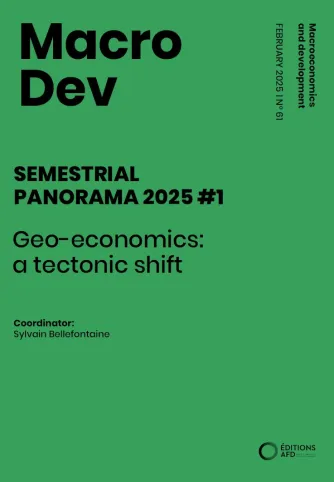Share the page
MacroDev - Semestrial Panorama 2025 #1
Published on

As we move into 2025, the legitimacy of the world order inherited from the fall of the Iron Curtain is confronted more than ever with the “ambivalent superpower” of the United States, already described by H. Kissinger in his book, but also with accusations of “double standards” between the North and South. This concerns both respect for human rights and freedoms and the consideration of CO2 emissions. In terms of the distribution of power, over the same period between 1990 and 2023, the weight of the United States in world GDP stagnated, even falling slightly from 27% to 26%, while the weight of China grew about tenfold, from 1.7% to 16.9%. Combined with the increasing weight of middle powers, such as the BRICS, we can clearly see that the geopolitical equation has changed dramatically, but we may not have been aware of the impact that this would have on “geo-economic” dynamics.
This new situation raises a number of questions for those interested in emerging and developing economies: How to take geopolitical factors into account in economic models? What resilience mechanisms can cushion the geopolitical shocks? And, especially, how to promote a bilateral and multilateral dialogue able to mitigate the risks of fragmentation? Once again, this MacroDev Semestrial Panorama does not claim to answer all these questions, but seeks to provide insight, so that the uncertainty we are experiencing does not prevent us from considering more peaceful futures.
Useful Information
-
Authors
-
Coordinators
-
Edition
-
61
-
Number of pages
-
52
-
ISSN
-
2116-4363
-
Collection
-
Macrodev
-
Other languages
